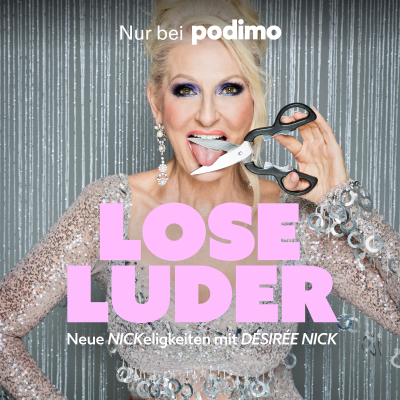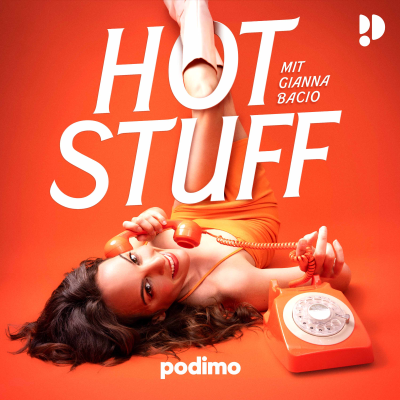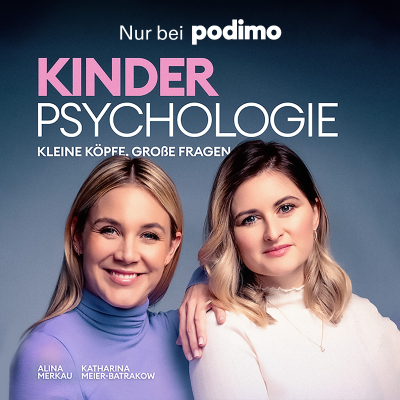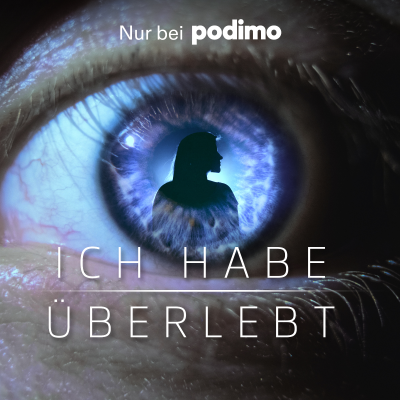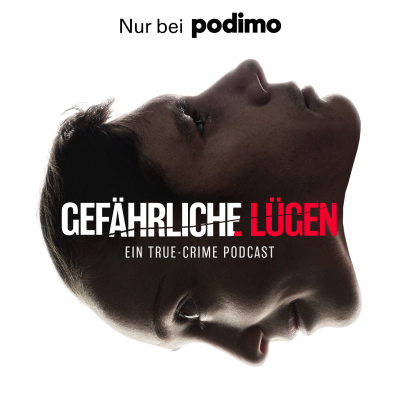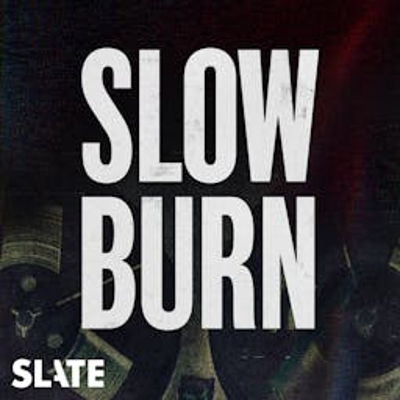
Slow Burn
Englisch
Kostenlos bei Podimo
Kostenlos hören bei Podimo
Starte jetzt und verbinde dich mit deinen Lieblingspodcaster*innen
- Vertraut von über 1 Mio. deutschen Hörer*innen
- Über 1.000 lokale Podcasts und Shows – nur bei Podimo
- Keine Zahlung nötig
Mehr Slow Burn
Slow Burn illuminates America’s most consequential moments, making sense of the past to better understand the present. Through archival tape and first-person interviews, the series uncovers the surprising events and little-known characters lurking within the biggest stories of our time.Want more Slow Burn? Join Slate Plus to unlock full, ad-free access to Slow Burn and your other favorite Slate podcasts. You can subscribe directly from the Slow Burn show page on Apple Podcasts and Spotify. Or, visit slate.com/slowburnplus to get access wherever you listen.Season 10: The Rise of Fox NewsHow a cable news channel became a cultural and political force—and how a whole bunch of people rose up to try and stop it.Season 9: Gays Against BriggsA nationwide moral panic, a California legislator who rode the anti-gay wave, and the LGBTQ+ people who stepped up and came out to try and stop him.Season 8: Becoming Justice ThomasWhere Clarence Thomas came from, how he rose to power, and how he’s brought the rest of us along with him, whether we like it or not. Winner of the Podcast of the Year at the 2024 Ambies Awards.Season 7: Roe v. WadeThe women who fought for legal abortion, the activists who pushed back, and the justices who thought they could solve the issue for good. Winner of Apple Podcasts Show of the Year in 2022.Season 6: The L.A. RiotsHow decades of police brutality, a broken justice system, and a video tape set off six days of unrest in Los Angeles.Season 5: The Road to the Iraq WarEighteen months after 9/11, the United States invaded a country that had nothing to do with the attacks. Who’s to blame? And was there any way to stop it?Season 4: David DukeAmerica’s most famous white supremacist came within a runoff of controlling Louisiana. How did David Duke rise to power? And what did it take to stop him?Season 3: Biggie and TupacHow is it that two of the most famous performers in the world were murdered within a year of each other—and their killings were never solved?Season 2: The Clinton ImpeachmentA reexamination of the scandals that nearly destroyed the 42nd president and forever changed the life of a former White House intern.Season 1: WatergateWhat did it feel like to live through the scandal that brought down President Nixon? Hosted on Acast. See acast.com/privacy for more information.
Alle Folgen
333 FolgenDecoder Ring | Making Coal Cute Again
Three weeks ago, U.S. Secretary of the Interior Doug Burgum shared an unusual tweet [https://x.com/SecretaryBurgum/status/2014382110828536183]: a cartoon image of himself with his arm draped around a giant, anthropomorphized lump of coal. This piece of coal has big googly eyes and a smudge of a nose, and is wearing a safety vest and a hard hat. He is, frankly, adorable—and he has a name: Coalie. When Coalie first appeared on the internet, he went viral—ridiculed on social media, in newsletters, and even on late night talk shows [https://youtu.be/IhAXXY4SqW0?si=LMRHCeVWQMk0VScC]. And that’s because this big-eyed, cute piece of coal was widely understood to be coal propaganda, a tool to soften the coal industry’s image. But the truth about Coalie is more complicated. His origins tell a story about what it’s like for federal employees to try to do their work while navigating the Trump administration’s agenda. Coalie may be widely seen as a mascot for coal mining, but that’s not what he was made for. In this episode, you’ll hear from Simone Randolph, Director of Communications for the Office of Surface Mining Reclamation and Enforcement (OSMRE) [https://www.osmre.gov/news/stories/10-things-know-about-how-osmre-supports-americas-energy-legacy-and-communities]; Sara Eckert, formerly of OSMRE; Slate staff writer Nitish Pahwa [https://slate.com/author/nitish-pahwa]; and Leah Stokes [https://www.leahstokes.com/], who researches climate and energy policy at the University of California, Santa Barbara and co-hosts the podcast A Matter of Degrees [https://www.degreespod.com/]. Thank you to Daniel Raimi, Tony Ho Tran, and Hannah Northey. This episode was written by Willa Paskin and Evan Chung and produced by Evan Chung, Decoder Ring’s supervising producer. Our show is also produced by Max Freedman and Katie Shepherd. Merritt Jacob is Senior Technical Director. If you have any cultural mysteries you want us to decode, email us at DecoderRing@slate.com [DecoderRing@slate.com] or leave a message on our hotline at (347) 460-7281. Get more of Decoder Ring with Slate Plus! Join for exclusive bonus episodes of Decoder Ring and ad-free listening on all your favorite Slate podcasts. Subscribe from the Decoder Ring show page on Apple Podcasts [https://podcasts.apple.com/us/podcast/decoder-ring/id1376577202] or Spotify [https://open.spotify.com/show/3vYNA0Ki5sUHnYC9QwQnKl]. Or, visit slate.com/decoderplus [https://slate.com/podcast-plus?utm_medium=link&utm_campaign=plus_pod&utm_content=Decoder_Ring&utm_source=episode_summary] for access wherever you listen. ---------------------------------------- Hosted on Acast. See acast.com/privacy [https://acast.com/privacy] for more information.
Decoder Ring | Is Culture Stuck?
It’s a weird time for culture. There is more of it than ever before, it’s more accessible than ever before, but so little of it feels original. New movies are based on old stories, new songs are recycling old hooks, and fashion trends are cycling so fast that everything’s in. Has our culture grown stagnant? The author and culture critic W. David Marx [https://culture.ghost.io/] thinks so. His new book, Blank Space [https://www.penguinrandomhouse.com/books/769187/blank-space-by-w-david-marx/], argues that there is a “blank space” in the 21st century where cultural innovation should be. In this episode, David explains to Willa how culture change worked in the 20th century, what changed after the turn of the millennium, and what we might do about it. This episode was produced by Max Freedman. Decoder Ring is also produced by Willa Paskin, Katie Shepherd, and Evan Chung, our supervising producer. Merritt Jacob is Senior Technical Director. If you have any cultural mysteries you want us to decode, email us at DecoderRing@slate.com [DecoderRing@slate.com] or leave a message on our hotline at (347) 460-7281. Get more of Decoder Ring with Slate Plus! Join for exclusive bonus episodes of Decoder Ring and ad-free listening on all your favorite Slate podcasts. Subscribe from the Decoder Ring show page on Apple Podcasts [https://podcasts.apple.com/us/podcast/decoder-ring/id1376577202] or Spotify [https://open.spotify.com/show/3vYNA0Ki5sUHnYC9QwQnKl]. Or, visit slate.com/decoderplus [https://slate.com/podcast-plus?utm_medium=link&utm_campaign=plus_pod&utm_content=Decoder_Ring&utm_source=episode_summary] for access wherever you listen. ---------------------------------------- Hosted on Acast. See acast.com/privacy [https://acast.com/privacy] for more information.
Decoder Rings Back | Why the Mona Lisa?
We are really lucky to get lots of listener suggestions for the show, more good questions than we can possibly answer in a mailbag episode once or twice a year. So we’re starting a new segment we call… Decoder Rings Back! Every month, host Willa Paskin will personally call up a listener to answer their question. In this inaugural installment of Decoder Rings Back, Willa calls up listener Dustin Malek about his cultural mystery: Why did the Mona Lisa, of all paintings, become the most famous in the world, bar none? Willa shares the story of daring heist that turned Leonardo da Vinci’s enigmatic smiling subject into a celebrity. Future episodes of Decoder Rings Back will only be available to Slate Plus subscribers. So if you want to be sure not to miss them, sign up for Slate Plus! You’ll get exclusive episodes and ad-free listening not just on our show, but all your favorite Slate podcasts. Subscribe from the Decoder Ring show page on Apple Podcasts [https://podcasts.apple.com/us/podcast/decoder-ring/id1376577202] or Spotify [https://open.spotify.com/show/3vYNA0Ki5sUHnYC9QwQnKl], or visit slate.com/decoderplus [https://slate.com/podcast-plus?utm_medium=link&utm_campaign=plus_pod&utm_content=Decoder_Ring&utm_source=episode_summary] for access wherever you listen. This episode was produced by Max Freedman. Decoder Ring is also produced by Katie Shepherd and Evan Chung, our supervising producer. Merritt Jacob is Senior Technical Director. If you have any cultural mysteries you want us to decode, email us at DecoderRing@slate.com [DecoderRing@slate.com] or leave a message on our hotline at (347) 460-7281. Sources for This Episode Cumming, Laura. “The man who stole the Mona Lisa [https://www.theguardian.com/artanddesign/2011/aug/05/mona-lisa-theft-louvre-leonardo],” The Guardian, August 5, 2011. Hoobler, Dorothy, and Thomas Hoobler. “Stealing Mona Lisa [https://www.vanityfair.com/culture/2009/05/mona-lisa-excerpt200905?printable=true%C2%A4tPage=all],” Vanity Fair, April 16, 2009. Hoobler, Dorothy, and Thomas Hoobler. The Crimes of Paris: A True Story of Murder, Theft, and Detection [https://www.amazon.com/Crimes-Paris-Story-Murder-Detection/dp/0803234325], Bison Books, 2010. Isaacson, Walter. Leonardo da Vinci [https://www.amazon.com/Leonardo-Vinci-Walter-Isaacson/dp/1501139169/], Simon & Schuster, 2018. Roberts, Sam. “Happy Birthday to the Man Who Stole the Mona Lisa and Took It to Italy [https://www.nytimes.com/2022/10/07/arts/design/mona-lisa-vincenzo-peruggia.html],” The New York Times, October 7, 2022. Sassoon, Donald. “Mona Lisa: The Best-Known Girl in the Whole Wide World [https://www.jstor.org/stable/4289718],” History Workshop Journal, Spring 2001. Sassoon, Donald. Mona Lisa: The History of the World’s Most Famous Painting [https://www.amazon.com/Mona-Lisa-History-Painting-Best-Known/dp/0007106157], HarperCollins, 2016. “The Theft That Made The 'Mona Lisa' A Masterpiece [https://www.npr.org/2011/07/30/138800110/the-theft-that-made-the-mona-lisa-a-masterpiece],” NPR, July 30, 2011. Zug, James. “Stolen: How the Mona Lisa Became the World’s Most Famous Painting [https://www.smithsonianmag.com/arts-culture/stolen-how-the-mona-lisa-became-the-worlds-most-famous-painting-16406234/],” Smithsonian Magazine, June 15, 2011. ---------------------------------------- Hosted on Acast. See acast.com/privacy [https://acast.com/privacy] for more information.
The Slate Culture Gift Guide
Hark, the holiday season is upon us—and with it the most solemn of festive traditions: a gift guide! In this video and podcast special, Slate hosts Dana Stevens, Chris Molanphy, and Willa Paskin beam-in from their collective hearths to deliver unto the internet their favorite gifts for culture lovers this holiday. In addition to sharing gifts, they also discuss the cultural artifact that is the “holiday gift guide,” and its history going back to the early 20th century, up to the modern day. See the entirety of the 1910 gift guide Our Special Holiday Gift-Book [https://wearinghistoryblog.com/2015/12/my-christmas-gift-to-you-1910s-holiday-wish-book-catalog/] from Greenhut-Siegel Cooper, and Esquire’s ultra-mod gift guide from 1961. [https://www.peculiarmanicule.com/esquire-gift-guide] Check out our gift recommendations below: Dana Stevens’ Cozy Movie Night-In: * The Salbree Collapsible Silicone Microwave Popcorn Popper [http://www.amazon.com/dp/B01CMT8DFU/?tag=slatmaga-20] & Amish Country Popcorn [http://www.amazon.com/dp/B001J3ZUQ6/?tag=slatmaga-20] * L'agraty Chunky Knit Blanket Throw [http://www.amazon.com/dp/B0F3XRF6ZN/?tag=slatmaga-20] * The Adventures of Antoine Doinel, The Criterion Collection Box Set [http://www.amazon.com/dp/B0F4YDQPXQ/?tag=slatmaga-20] Chris Molanphy’s Hit Parade Collection: * The Beatles’ Revolver CD Box Set [http://www.amazon.com/dp/B0BB3F4J1J/?tag=slatmaga-20] * Mad Men Blu-Ray Box Set [http://www.amazon.com/dp/B013BPR7OC/?tag=slatmaga-20] * Can't Slow Down: How 1984 Became Pop's Blockbuster Year, by Michaelangelo Matos [http://www.amazon.com/dp//?tag=slatmaga-20] Willa Paskin’s Fruit-Themed Trompe-l'œil Housewares: * Cantaloupe-shaped bowls in the style of Bordallo Pinheiro [https://www.etsy.com/listing/57290874/tall-cantaloupe-bowl] * 4-Pack Orange-Shaped Candle Stocking Stuffer [http://www.amazon.com/dp/B0FHWMVMDV/?tag=slatmaga-20] * Cherry-Shaped Toilet Brush [http://www.amazon.com/dp/B0DJNY3B2L/?tag=slatmaga-20] The Slate Culture Gift Guide is produced for Slate Studios by Benjamin Frisch and Micah Phillips, with Meryl Bezrutczyk and Andrew Harding. Learn more about your ad choices. Visit megaphone.fm/adchoices [https://megaphone.fm/adchoices]
The Slate Culture Gift Guide
Hark, the holiday season is upon us—and with it the most solemn of festive traditions: a gift guide! In this video and podcast special, Slate hosts Dana Stevens, Chris Molanphy, and Willa Paskin beam-in from their collective hearths to deliver unto the internet their favorite gifts for culture lovers this holiday. In addition to sharing gifts, they also discuss the cultural artifact that is the “holiday gift guide,” and its history going back to the early 20th century, up to the modern day. See the entirety of the 1910 gift guide Our Special Holiday Gift-Book [https://wearinghistoryblog.com/2015/12/my-christmas-gift-to-you-1910s-holiday-wish-book-catalog/] from Greenhut-Siegel Cooper, and Esquire’s ultra-mod gift guide from 1961. [https://www.peculiarmanicule.com/esquire-gift-guide] Check out our gift recommendations below: Dana Stevens’ Cozy Movie Night-In: * The Salbree Collapsible Silicone Microwave Popcorn Popper [http://www.amazon.com/dp/B01CMT8DFU/?tag=slatmaga-20] & Amish Country Popcorn [http://www.amazon.com/dp/B001J3ZUQ6/?tag=slatmaga-20] * L'agraty Chunky Knit Blanket Throw [http://www.amazon.com/dp/B0F3XRF6ZN/?tag=slatmaga-20] * The Adventures of Antoine Doinel, The Criterion Collection Box Set [http://www.amazon.com/dp/B0F4YDQPXQ/?tag=slatmaga-20] Chris Molanphy’s Hit Parade Collection: * The Beatles’ Revolver CD Box Set [http://www.amazon.com/dp/B0BB3F4J1J/?tag=slatmaga-20] * Mad Men Blu-Ray Box Set [http://www.amazon.com/dp/B013BPR7OC/?tag=slatmaga-20] * Can't Slow Down: How 1984 Became Pop's Blockbuster Year, by Michaelangelo Matos [http://www.amazon.com/dp//?tag=slatmaga-20] Willa Paskin’s Fruit-Themed Trompe-l'œil Housewares: * Cantaloupe-shaped bowls in the style of Bordallo Pinheiro [https://www.etsy.com/listing/57290874/tall-cantaloupe-bowl] * 4-Pack Orange-Shaped Candle Stocking Stuffer [http://www.amazon.com/dp/B0FHWMVMDV/?tag=slatmaga-20] * Cherry-Shaped Toilet Brush [http://www.amazon.com/dp/B0DJNY3B2L/?tag=slatmaga-20] The Slate Culture Gift Guide is produced for Slate Studios by Benjamin Frisch and Micah Phillips, with Meryl Bezrutczyk and Andrew Harding. ---------------------------------------- Hosted on Acast. See acast.com/privacy [https://acast.com/privacy] for more information.
